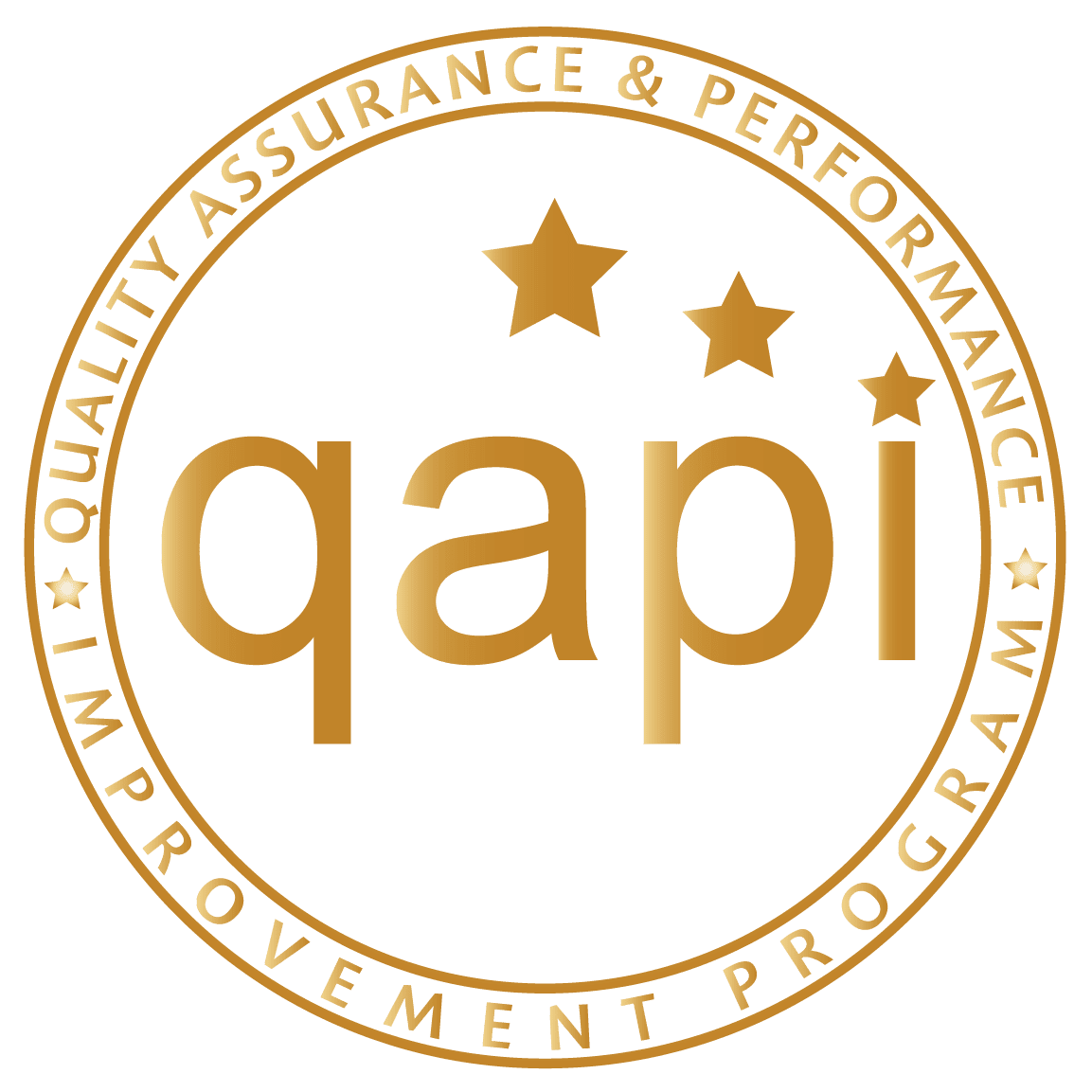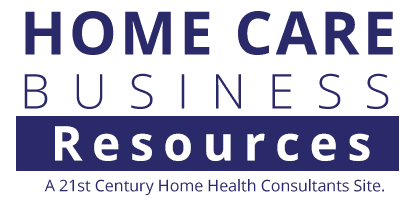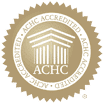Program Benefits
What is QAPI and why is it so important?
What is QAPI?
The definition is in the name, Quality Assessment and Performance Improvement (QAPI). QAPI is the marriage of two complementary approaches to quality management, Quality Assurance (QA) and Performance Improvement (PI). Both utilize data, but are different in some key ways:
- QA is a process of complying with regulations to meet quality standards and assuring that patient care reaches and maintains an acceptable level. QA is a reactive, retrospective effort to analyze why or how an agency failed to meet certain standards. QA activities do improve quality, but efforts typically end once the standard is met.
- PI (also referred to as Quality Improvement – QI) is a pro-active and continuous review of processes and data with the intent to prevent or decrease the likelihood of problems by identifying areas of opportunity and implementing new approaches to identify and resolve root causes of ongoing/systematic problems. PI aims to improve processes and make good quality even better.
Why is it important?
QAPI is not a one-time, or annual, process but a continuous one. A continuous and comprehensive QAPI program leads to fewer mistakes.
Your QAPI program establishes benefits such as efficiency and accountability in your staff.
Increased efficiency and accountability lead to fewer mistakes, which in turn can result in decreased costs and increased reimbursement.
One of the most important benefits of a well-rounded QAPI program is improved patient care and outcomes. When patient care and outcomes are improved it benefits both the patient and your agency.
The benefits to your agency include increased reimbursement, a higher star rating from Medicare which can lead to an increase in referrals, and even national recognition. The home care industry is actively moving towards a keen focus on quality and your agency’s reimbursement is contingent on your patient outcomes.
This means that patient outcomes are vitally important to the financial health and stability of your agency.
ADR’s – If you are a Medicare agency, you are guaranteed to receive what is called an Additional Development Request (ADR) from your Medicare Administrative Contractor (MAC). ADRs cannot be avoided; the requests may occur at random or based on red flags in your claim’s submissions.
As part of an ADR, the agency must submit the requested patient chart so the MAC can review it for compliance. If the reviewer concludes the claim is non-compliant, the claim will be denied.
The MAC will then automatically request additional charts from the agency until your agency has achieved a minimum of 80% approval. This can be financially devastating if your agency has not been diligent in its processes.
How Can we help?
To maintain quality services and stay on top of industry trends, and in turn avoid low reimbursement rates and well claim denials, your agency will need comprehensive support. 21st Century is committed to being your partner in ensuring your agency maintains compliance with all state, federal, and accrediting body standards.
Our Quality Outcomes Program focuses on 3 Key Areas:
- Clinical Compliance
- Regulatory Compliance
- Quality Improvement

Clinical Compliance
Remote Chart Audits
By having your Charts audited every six months will ensure you that your client and personnel charts are current and represent your policies. We will review clinical and personnel charts and provide you with feedback regarding any deficiencies found and how to correct the deficiencies found.
Nurse On-Call
Have peace of mind knowing that an experienced home care clinician is just a phone call away. In the event a surveyor arrives, your clinical liaison will be available to assist with locating any policies/forms and answer any questions posed by the surveyor, avoiding possible deficiencies.
Plans of Correction
If for any reason your agency receives a plan of correction, this will be completed by your team at 21st Century. You and your staff will be given the guidance needed to implement any actions required resulting from deficiencies at the time of survey.
Regulatory Compliance
Continuous Policy Updates
Having updated, current policies will ensure that you stay compliant with Federal and
State requirements, and that your agency is not assessed fines or penalties.
You will receive continuous updates to policies that include:
- State regulations revisions that require policy changes.
- State regulation revisions that require forms/documentation to be changed.
- Accreditation standard changes that require policy changes.
- Accreditation standard changes that require forms/documentation to be changed. Policy changes based on any regulation or law revisions by OSHA, FDA, CDC, EEOC.
State License and 855a Application Assistance
Our team will complete the necessary documents to renew your state home health agency license. Required documentation and attachments for the renewal will be assembled into a professional format to ensure smooth processing.
In order to remain compliant with state and CMS regulations, any changes to your agency information must be reported as appropriate. Should your agency undergo changes, we will complete the necessary paperwork.
This includes changes such as:
- Address Updates
- Key Personnel Changes
- Additions to Services
Quality Improvement
Quality Improvement
On a monthly basis, your agency will have a scheduled call with a quality coach to review agency quality improvement indicators with a focus on high-risk, high volume, and problem-prone areas.
This will include discussing and trending data gathered through your agency’s QAPI program and discussing action plans as needed.
Annual planning and reminders for required committee meetings, evaluations, drills, and reporting to ensure your agency has completed all items which may be easy to forget but are vital to your operations.
Recertification/Reaccreditation
Once an agency completes their initial accreditation, it can become complacent because they have achieved their immediate goal. This oftentimes results in very serious issues in the recertification process which occurs in year three.
When the time comes for you to complete recertification with your accrediting body, your agency will have accumulated three years’ worth of data for the surveyor to review. The result is a recertification survey is much more intense than an initial accreditation survey.
If your agency is not vigilant and compliant at all times, this will lead to issues at the recertification survey. Major deficiencies in this survey may result in multiple visits from your accrediting body. This can cost your agency thousands of dollars and jeopardize your accreditation.
Active participation in our Quality Assessment Program will ensure that when the time for your recertification comes, you will pass with flying colors. By staying on top of quality agency operations, you will have a hassle-free re-accreditation.
Monthly Call Agendas
Administrative indicators (9) including corporate compliance, HIPAA breach reports, Administrative performance improvement project, billing audits, complaints and grievances, satisfaction surveys/CAHPS, star rating report, workers comp claims and staff incident reports, and safety prevention/emergency preparedness.
Clinical indicators (9) include chart audits, incident reports, and medication errors, infection reports, infections and communicable disease reports, patient-focused performance improvement project, rehospitalization emergency room visits, rehospitalization prevention program, sentinel events and MedWatch tracking, and utilization reports.
Quarterly QAPI Review includes a review of all indicators for the previous quarter. Identification of quality indicators, trends, action plans, chart audit review, and outcomes. A review of your agency’s QAPI committee meeting minutes ensures that all required and appropriate topics are addressed and resolved as needed.
January – Annual agency review and annual QAPI program evaluation (Oct/Nov/Dec data also)
February – Administrative Indicator review
March – Clinical Indicator review
April – Quarterly QAPI review (Jan/Feb/March data)
May – Administrative Indicator review
June – Clinical Indicator review
July – Quarterly QAPI review (April/May/June data)
August – Administrative Indicator review
September – Clinical Indicator review
October – Quarterly QAPI review (July/Aug/Sept data)
November – Administrative Indicator review
December – Clinical Indicator review


